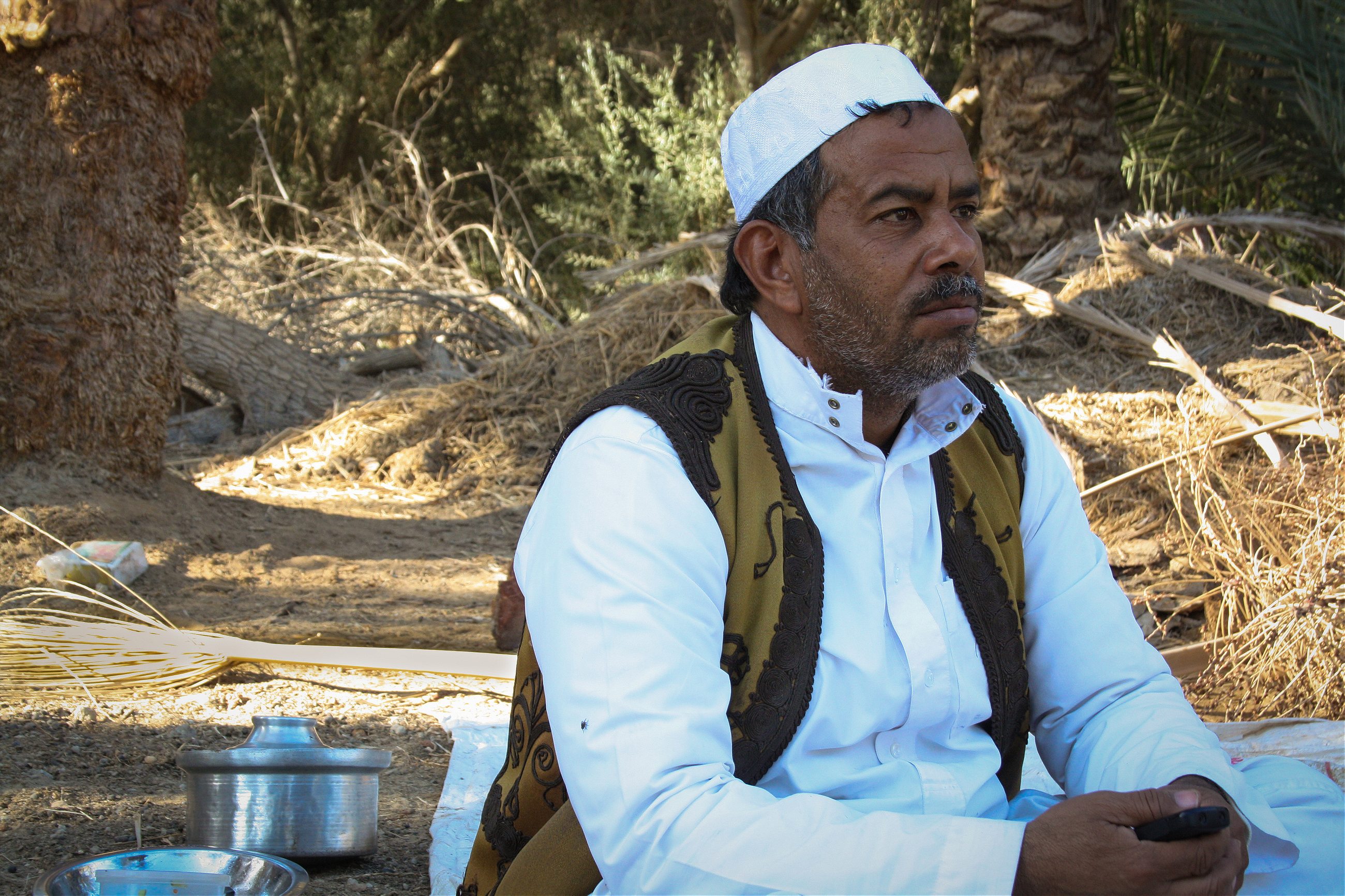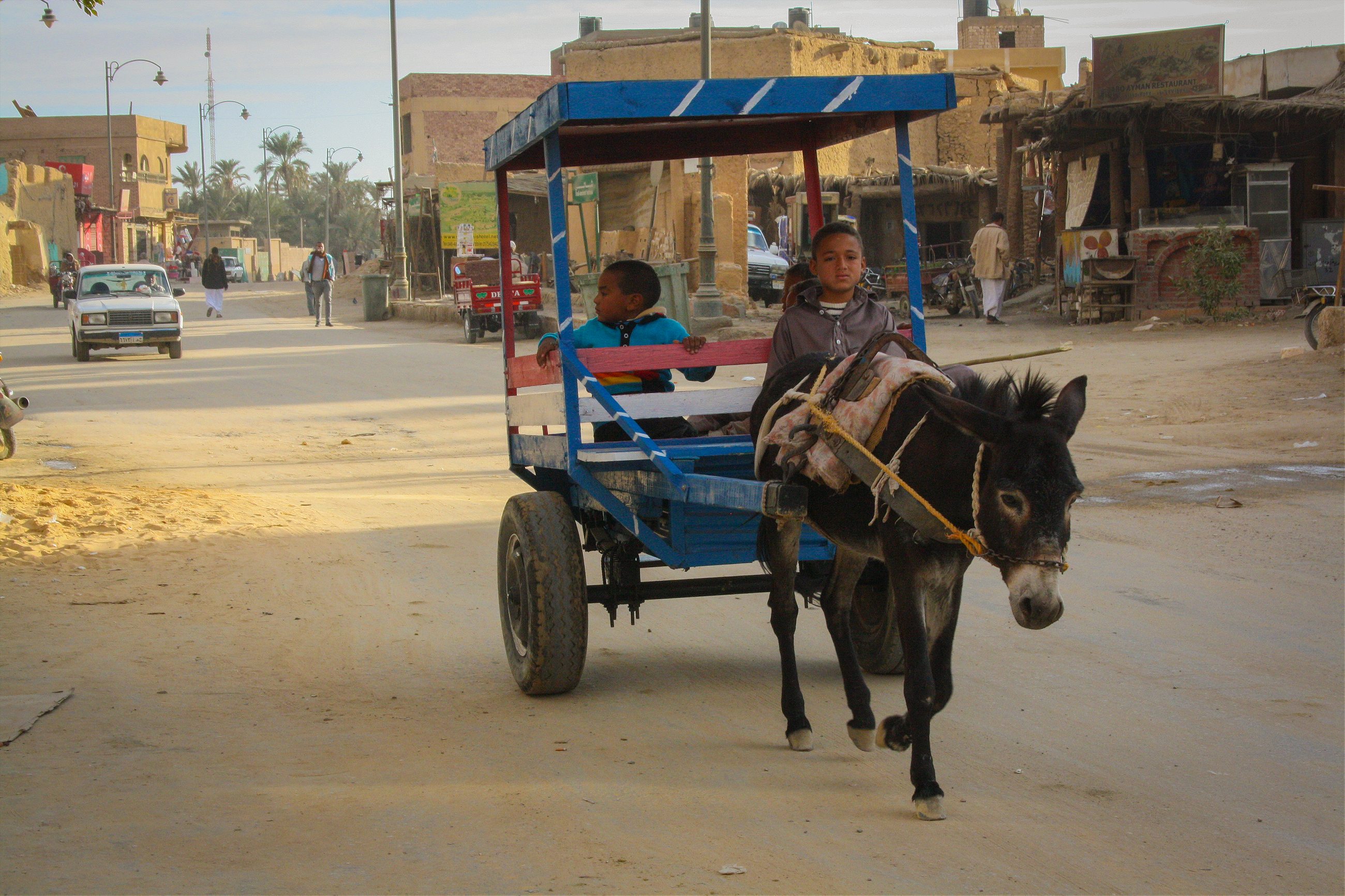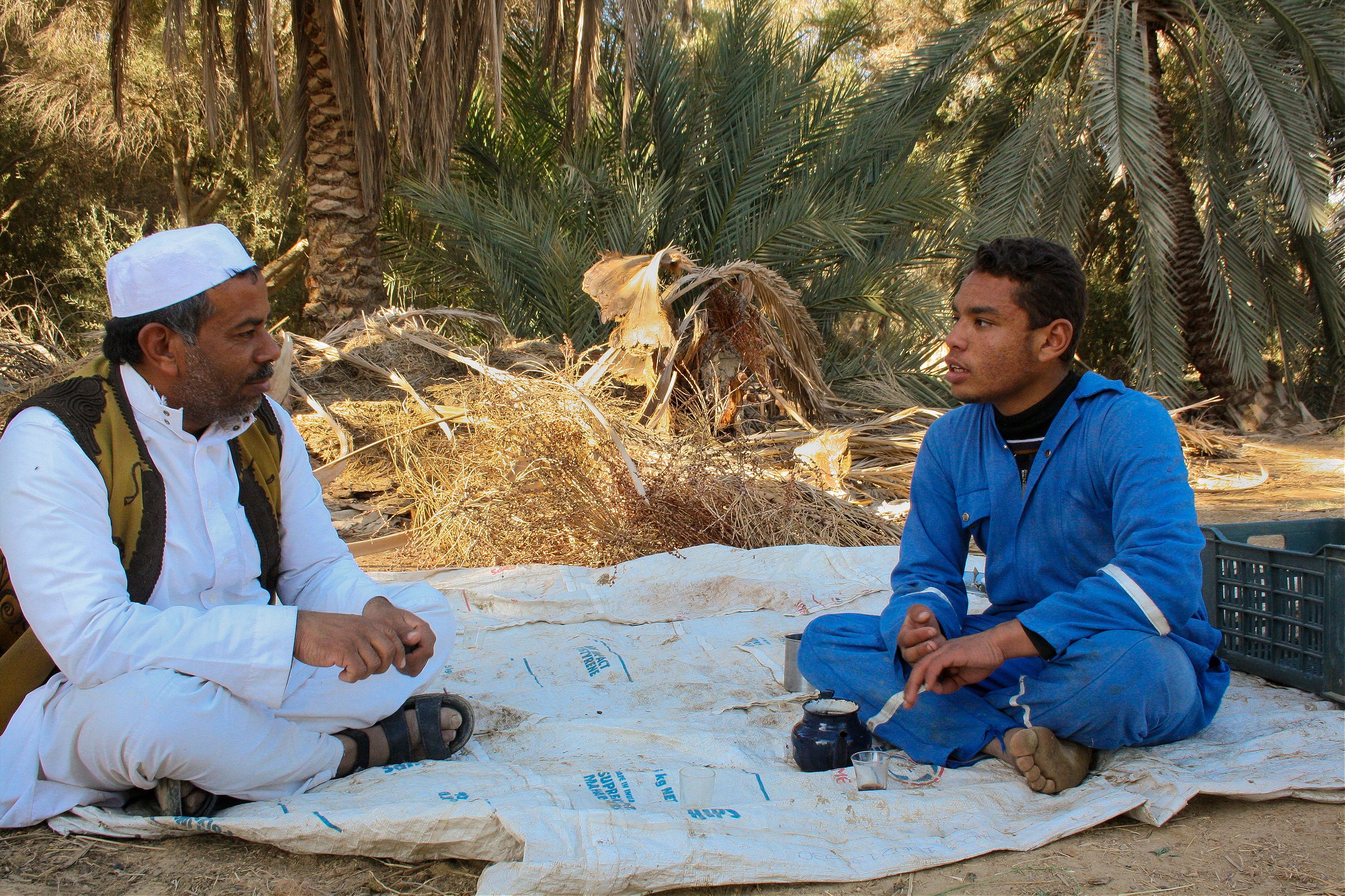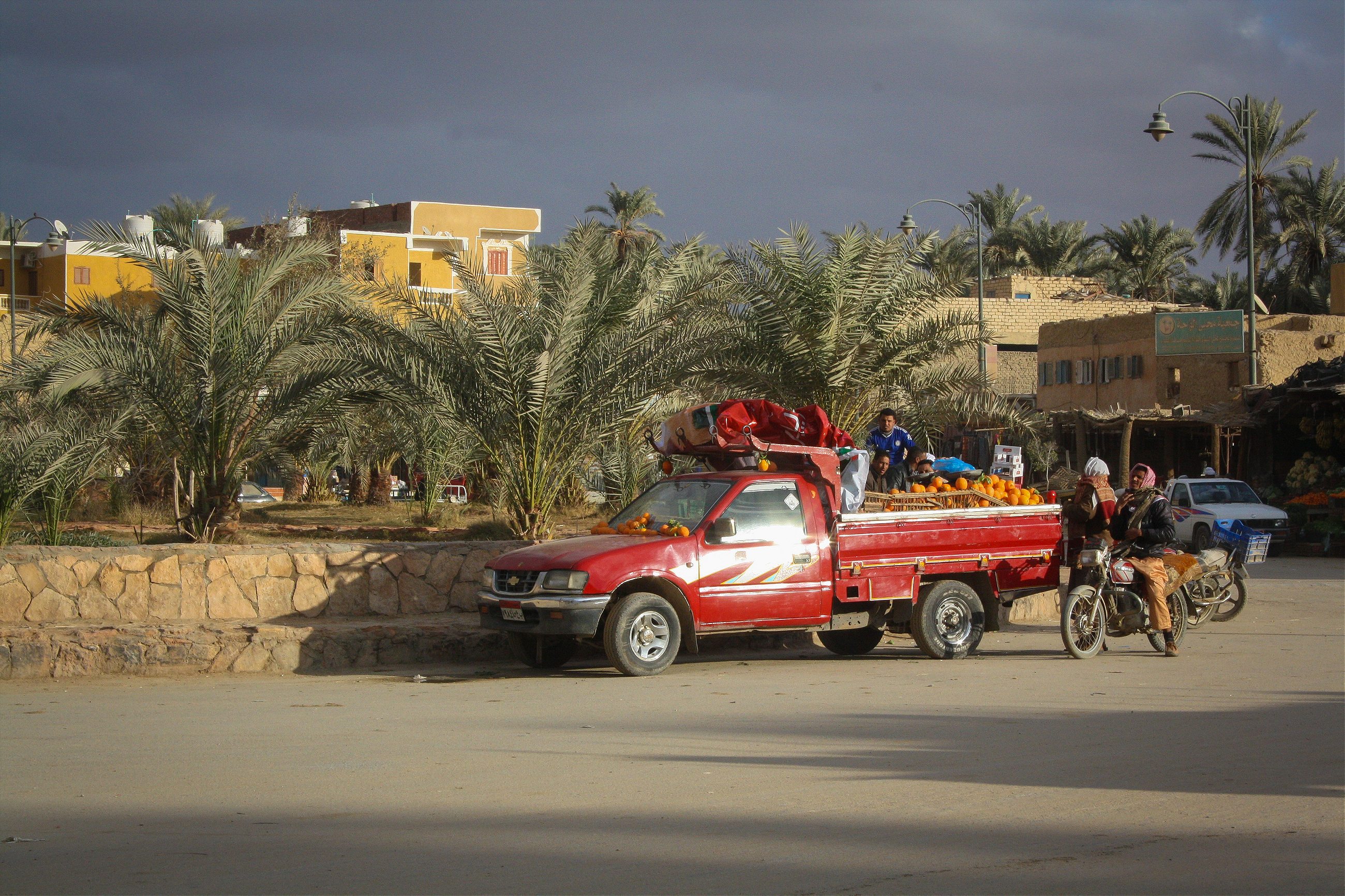In Egypt’s frontier, a centuries-old code of tribal law is losing its sway.
Clouds of dust drift down the main drag of Siwa’s tiny downtown, casting a yellow fog over the quiet street lined with small shops. If tumbleweeds were to roll by, it could be a scene from a Western movie. But the sand wafting by us comes not from the American Southwest, but from the Western Desert, “the great sand sea” that sprawls over the border of Egypt and Libya.
A small oasis town, Siwa is also the eastern frontier for North Africa’s Amazigh, or Berber, population. There are 11 tribes in the area, ten of which have Amazigh lineage. (The last is Bedouin; while both Berbers and Bedouins were once nomadic tribes, Bedouins descended from the Arabian Peninsula.) A mutual indifference between the central state and the isolated community has meant that Egyptian civil law was often disregarded in favor of ‘urfi (customary) law. However, this centuries-old system—overseen by the tribes’ sheikhs, who preside as judges—is beginning to lose its sway over residents. Once a mainly agricultural-based and poorly performing economy, an influx of money and changing social dynamics in Siwa have challenged the credibility of its tribal justice system.
“When people come to me, there is a better chance the system will work,” says Sheikh Mashry as he dumps a generous amount of sugar into a steaming teapot. “You can lie in front of the police, but you can’t lie in front of your family or your tribe.” Holding the pot nearly a foot in the air, he pours the syrupy liquid into three small glasses, extending one to each of us and saving one for himself. The sheikh’s old black Nokia phone rings persistently throughout our conversation. He answers one call from another sheikh. “There’s a property dispute and I have to check it out later today,” he says as he hangs up.

‘Urfi was brought to the area by the nomadic tribes who settled here in the 12th century. A preference for its practice endures, and the sheikh tells us that the police and civil courts are rarely called upon to intervene in disputes. Each of the 11 tribes has one sheikh at its head, responsible for arbitrating issues within the clan and intra-tribal affairs involving his people. A board of ten elders provides additional counsel to each sheikh, serving as a sort of jury in more serious cases.
During the arbitration, or mei’ad, as it is called in Siwi, each side brings their father and an uncle to present their cases. (Women are only allowed to attend arbitration as plaintiffs.) “The majority of cases are about property or marriage relations,” says Mashry, but notes that ‘urfi can be applied to any dispute short of a murder case (which is brought to the police and sent through state courts).
Incarceration is unheard of under ‘urfi law, and maintaining social ties in the tight-knit society is paramount. “The important thing is that the penalty is fair and isn’t too harsh, so that the conflict will end quickly and trust is maintained between tribes,” Mashry says. The sentences usually boil down to an apology, or a fine paid by the offender and a reconciliatory dinner.

However, just a few decades ago, penalties usually involved corporal punishment: often beatings using, ironically, an olive branch, according to research by local Siwan anthropologist Fathi Melim. Melim wrote a book on the topic in 2001, but received threats of exile from his community unless he agreed to remove ‘secrets’ meant only for Siwans. Rather than lose the protection of his community, he made the edits.
When asked about this punishment, there is much throat clearing and pillow shuffling from Mashry. At last, the sheikh hesitantly speaks about tribal exile, considered the harshest verdict under ‘urfi. “If you do something that puts you at strain with all the other tribes, or if you did something against our customs, or your own family decides to disown you, the punishment is considered,” he concedes. While the convicted is allowed to stay in Siwa, they “lose all their protection—their house, their job—they face total ostracism,” says Mashry. He says that it is extremely rare, but declined to divulge its prevalence.
The sheikh says he does work with the police beyond reporting rare homicides, but maintains that issues are best resolved internally through ‘urfi. “Now there are some young people that go directly to the police, but the police are corrupt. They might take money, and even then, it will take at least two to three years for the issue to be resolved.”
But the superiority of sheikhs over the police is no longer clear-cut to some residents, who say that distrust has been seeping through the tribal system over the past few years. “And when you lose the trust, you lose the respect,” says Hisham, a Siwan archaeologist who preferred to withhold his actual name in order to avoid problems with his community.

Sitting in a dimly lit restaurant, surrounded by the ubiquitous glasses of strong tea infused with lemongrass or mint, Hisham explains that a major conflict concerns a stretch of land that was deemed useless for cultivation and had been considered common property for centuries. “But in 2011, the salt deposits were discovered, and soon after that, we found that the sheikhs had already divided it under the table for themselves,” Hisham says. The sheikhs were making deals with developers and middlemen with alleged ties to the central government, and pocketing the income for themselves.
“We didn’t really have a revolution in Siwa, but in a way, we did when we found out and then went to the sheikhs’ doors shouting, ‘Get out, you’re thieves!’” Hisham says with a grin. Hisham edges closer to the wall, away from the restaurant’s crowd, before uttering, almost inaudibly, “Now you have to be a businessman first, before being a sheikh.”
“A group of us sat-in on the salt field for seven days to defend it as public property,” says Mohamed, another local Siwi who also preferred to remain anonymous. He says that Bilal Ahmad Bilal Issa—a former member of parliament for the Marsa Matrouh region, in which Siwi is located—also had a hand in the affair and sent guards to kick them out. “We began fighting with the guards and burning gardens in the village. People tried to call the sheikhs to stop the whole thing, but found that the sheikhs had switched off their phones.”
No one can fight money
For now, the salt extraction is at a standstill, but land issues have been a heated topic in the town before. A similar incident took place in the early ‘90s, when it became apparent that with its gardens, hot springs, and off-road desert driving, Siwa was ripe for a tourist industry. Then, too, Hisham explains, land surrounding the town suddenly went from being common land to privately owned plots.
But while these issues have cropped up before, it’s over the past four years that fissures in the nearly thousand year-old system have intensified. “In the past 30 years, there was a lot of change, but since the discovery of the salt, it has been very rapid,” says Hisham. Before, Siwa was very isolated, and life was simple. “People were one,” Hisham says, but then it changed: “No one can fight money.”
The consensus amongst other Siwis we spoke to was that there were still four or five honest sheikhs in the bunch, yet no one thought that of their own. “If my sheikh calls me, I go and listen, but I don’t care what he says. And if I have a problem with someone else, we’ll go to his sheikh—if it’s one of the ones I still trust,” Mohamed says.
Still, most residents remain wary of the police. “Going to the police station means you’ve given up your right to ask for a sheikh. For it to be considered correct traditionally, you go to the sheikh first,” says Hisham. “Siwan psychology hates the police station; a lot go to the police, but rarely go through with the whole process.” But that’s not to say the outcome is dramatic either way. “It’s like having a problem and going to your grandfather, and then you go to your grandmother,” Hisham says. “Ultimately, whether you go to the sheikh or call upon the police, it’s pretty much the same. They all work for the Ministry of the Interior anyway.”
Security vacuums in 2011 led to a thriving smuggling racket
This connection with the central government has eroded the authority of the customary justice system. “Since the 1970s, sheikhs have had to have good relations with the national authorities,” Hisham says. One of the tribes has two sheikhs, “the one the MOI imposed, and the one the community had elected,” says Mashry. “But Siwis still consider them both equal in authority and they work together.” Every sheikh now needs to be officiated by the central government.
And government involvement is increasing in the area. Security vacuums in both Egypt and Libya in 2011 led to a thriving smuggling racket. Alongside the discovery of the salt deposits, gas extraction and solar energy projects have also sprouted in Siwa. Meanwhile, neighboring Libya continues to slide further into crisis. The Egyptian government is thus keen to pay more attention to the tiny border town they once ignored as it becomes increasingly relevant economically and geographically.

Prior to 2013 and the military’s resumption of control over the country, army officers patrolling the border turned a blind eye to smugglers bringing in weapons, drugs, and other contraband. “They didn’t care what came in under Morsi”—the former president of Egypt, who was eventually ousted by military officers—“they wanted there to be chaos,” Mohamed says. Now, however, the military is firming up their presence. There’s a coordinated crackdown on smuggling, and a promise of a road and a customs gate to be built over the formerly fluid border.
For now, movement across the border will likely remain eastbound. In mid-February, news of the gruesome beheading of 21 Coptic Christian Egyptians by ISIS militants in Libya lead Egypt to launch airstrikes over the country. Last week alone, nearly 15,000 Egyptians poured back into Egypt through a border crossing in Salloum, five hours north of Siwa. As violence continues in Libya, it is likely that there will be an even greater presence of military officers and a surge in security measures.
Already, however, inroads by the central state into the community have meant a reversal in power between the sheikhs and the members of Parliament, says Hisham. The sheikhs’ authority shrinks as they become more accountable to the central government. “The easiest way to become a sheikh is to have support from the governorate or the army officers.”
“Justice,” according to Sheikh Mashry, “means to do something you consider fair and right. To solve a problem by making a decision that will seem fair even after time passes.” Now, however, some in the community are questioning whether that definition of justice is actually practiced by the gatekeepers of their arbitration system. “Four years ago, it was as if everyone was blind,” Hisham says. “Then, suddenly they woke up, and the fights ensued.”